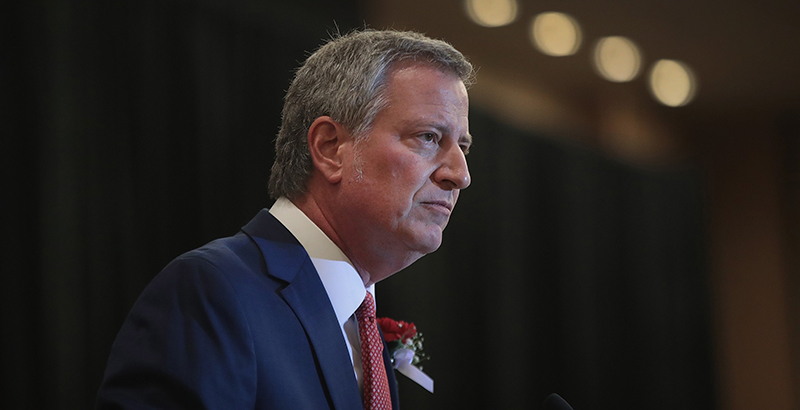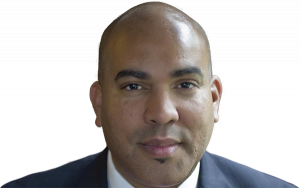Stewart: Hey, Bill de Blasio, I Was Once a Charter School Parent — and I Don’t Deserve Your ‘Hate’

For many reasons, I once enrolled my oldest child in a charter school.
I don’t deserve to be hated for doing that, especially by someone who is a candidate for the highest office in the country where I pay taxes; a country for which my grandfathers fought multiple wars, and a country that can’t even bring itself to apologize for its legacy of denying education to my people.
This is my message for New York Mayor Bill de Blasio, who recently fell ill with a trashy fit of apple polishing before the nation’s largest teachers union, where he advertised his “hate” for supporters of charter schools.
He calls us “privatizers.” I think that disqualifies him from leading us anywhere good. Leaders unite, demagogues divide. De Blasio’s rhetoric is meant to create an outgroup consisting of parents, students and teachers in charter schools — a minority in public education, but a sizable population still.
He may score points with the increasingly bitter public school workforce that grows ever more paranoid about — and cold-blooded toward — any individual or group that seeks to intervene in the failures of the systems generating their pensions. That will get him only so far. After he burns through the empty calories of political “hate” speech, one invalidating fact will dog him: He is currently the mayor over America’s most inequitable and failed school system. If he wears any clothes on the issue of education, they are made entirely of cellophane.
No honest person accuses NYC’s mayor of harboring effective or smart ideas about improving public education. His public record on the matter is one of costly failure and corruptibility. Along those lines, the most damning charge made against his administration is that it purposely trapped children in schools that it knew were “doomed.” Schools he wouldn’t put his own kids in, but ones he champions for the rest of us.
This is what he said to National Education Association members about charter schools and reform: “I am angry about the privatizers. I am sick and tired of these efforts to privatize a precious thing we need — public education. I know we’re not supposed to be saying ‘hate’ — our teachers taught us not to — I hate the privatizers and I want to stop them.”
In the end, he promised to end federal funding for charter schools.
In a recent interview, Errol Louis, political anchor at the New York City news channel New York 1, asked de Blasio: “Eighty-one percent, as you know, of New York City charter school students are economically disadvantaged; they are on free or reduced-priced lunch. When you say ‘no federal funds for charter schools,’ you mean you want to cut their Title 1 funding?”
It’s a smart question. “No federal funding for charter schools” sounds good as a defensive measure for the lobbyists of traditional public schools, but people of compassion (who as a rule are not among those lobbyists) should be clear that the funding in question is for students — young human beings who are every bit as deserving as their peers in the faltering New York traditional schools they’ve escaped.
According to the National Association of Charter School Authorizers, the main sources of federal funding to support charter schools — the funding de Blasio hopes to eliminate — are:
● Title I funds meant to address concentrations of student poverty;
● Title II funds that support professional development;
● Title III funds that support special student populations (i.e. special education); and
● Title IV funds that increase access to “quality charter schools.”
If you’re a person who believes it’s important to address the special challenges that arise when concentrations of student poverty form, and, further, you believe teachers need continuous training to serve special populations, how could you propose ending the funding needed to support those aims?
When I chose a charter school, it wasn’t because I wanted to privatize a perfectly awesome traditional system, or bust unions, or tear democracy apart, or any of the other heavy-handed focus-group-tested messages used to pit parents and voters against each other in the hopes that the one-size-fits-some school system can eliminate competition.
My reason was simple, and it should be understood by any person worthy of the American presidency. My hopes and dreams were tied up in thoughts of my child doing better than I did in school and life. That truly is the parent’s version of the American Dream.
My fears were the same as those of many parents around me, mostly based in the reality that children like mine weren’t doing well in their assigned schools. I found a charter school that was clean, safe, orderly and succeeding, and that was after we were turned away from popular district schools (including the type of selective magnet de Blasio’s family benefited from).
Is our goal in life to be good little leftist soldiers who sacrifice our most precious family members on the mountain of public school failure? Should we accept assignments to schools that mayors and public employees avoid for their own children?
Hell no.
I’m left to wonder what kind of donkey’s rear must you be to frame us as enemies and to say children like mine, parents like me and the schools that bring us hope are not worthy of a fair share of public resources.
Apparently, it’s a de Blasio donkey in a race to the educational bottom with a herd of other donkeys.
Chris Stewart is the CEO of Education Post, a media project of the Results in Education Foundation. Prior to leading Education Post, he served as CEO of the Wayfinder Foundation. He is a lifelong activist and 20-year supporter of nonprofit and education-related causes. In the past, Stewart has served as the director of outreach and external affairs for Education Post, the executive director of the African American Leadership Forum (AALF), and an elected member of the Minneapolis Public Schools Board of Education, where he was radicalized by witnessing the many systemic inequities that hold children back.
Help fund stories like this. Donate now!

;)
